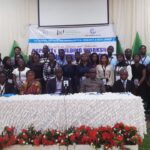By Abujah Racheal, News Agency of Nigeria (NAN)
Mrs Grace Ameh is a resident of Eyyan Community in Kwali Area Council in the Federal Capital Territory.
Each time her five-year-old daughter runs fever, her first suspicion will be malaria. This is because of limited access to diagnostic facilities.
Ameh said that a nearby patent medicine vendor often prescribed malaria drugs and antibiotics for her child without conducting any tests, relying solely on the symptoms.
“Weeks ago, my daughter’s condition worsened after multiple treatments. We kept giving her malaria drugs and antibiotics but nothing worked.
“Eventually, we rushed her to a hospital, where they told us that it was typhoid,” she narrated.
Ameh’s story reflects the harsh reality for millions of Nigerians, where fever is often equated with malaria.
Misdiagnosis is not just dangerous, it is fuelling a growing Antimicrobial Resistance (AMR) crisis.
According to the 2024 World Malaria Report, Nigeria accounted for 40 per cent of malaria cases and 46 per cent of malaria deaths among the 10 High Burden to High Impact (HBHI) countries last year.
Though global interventions have averted over 2.2 billion cases and 12.7 million deaths since 2000, malaria continues to threaten lives, particularly in sub-Saharan Africa, which shoulders 95 per cent of global malaria deaths.
Data from the Primary Healthcare Performance Initiative funded by the Bill & Melinda Gates Foundation also reveals a disturbing trend that diagnostic accuracy in Nigeria is just 36.4 per cent.
This means that fewer than four in 10 patients are correctly diagnosed.
Given that 70 per cent of diagnostic decisions rely on lab tests, the majority of Nigerians are being treated without laboratory confirmation, especially in primary healthcare settings.
Experts said that malaria is the most frequently mistreated disease in Nigeria. Community health centres, pharmacies and clinics often treat patients presumptively, resulting in poor outcomes and preventable deaths.
Akindele Opeyemi, a pharmacist and health systems consultant, said that the Malaria Rapid Diagnostic Test (MRDT) was designed to be affordable, fast and easy to use.
Opeyemi said that many frontline health workers were not using them consistently in spite of policy support.
“Community pharmacists, nurses and even some physicians have stopped using MRDTs. They do not trust the results, or the logistics are simply broken.
“In some cases, prior antibiotic use masks the malaria parasite, leading to false-negative MRDT results. Some MRDT kits are also too weak to detect low-level infections, further eroding trust,” he said.
According to him, when those treating over 70 per cent of malaria cases do not use diagnostic tests, it is no surprise that malaria deaths are rising.
Mr Batet Musa, Nutrition Policy Advisor at Resolve to Save Lives, said that even when malaria drugs were prescribed correctly, malnutrition could render treatment ineffective.
“Artemether/lumefantrine, a common malaria drug, requires fatty foods for optimal absorption, something many families cannot afford.
“A child fed only with pap won’t absorb the medicine well. Sometimes, it is not just fake drugs or misdiagnosis, it is hunger,” Musa said.
He said that sub-optimal dosing, especially in children due to poor knowledge or economic hardship, leads to treatment failure and severe complications.
Dr Ridwan Yahaya, Antimicrobial Stewardship Manager at the Nigeria Centre for Disease Control and Prevention (NCDC), said that antibiotics were frequently prescribed alongside malaria drugs.
Yahaya said that overtime, this indiscriminate use had led to a dangerous rise in drug-resistant bacteria, a problem now recognised as a major global health threat.
“Misdiagnosis contributes to antibiotic overuse. We are creating a population of resistant organisms, and that is deadly,” he said.
In spite of over 70 years of interventions, Nigeria still accounts for 30 per cent of global malaria cases (68 million) and 23 per cent of global malaria deaths (194,000 annually).
To reverse this, stakeholders are calling for a rethink of malaria strategies.
According to Prof. Muhammad Ali Pate, Coordinating Minister of Health and Social Welfare, 60 per cent of hospital visits in Nigeria are due to malaria, including at tertiary hospitals.
Pate said that this suggested a significant failure at the primary care level.
One promising initiative is the African Leadership and Management Training for Impact in Malaria Eradication (ALAMIME).
The initiative is coordinated by Makerere University’s School of Public Health and funded by the Bill and Melinda Gates Foundation.
ALAMIME is building leadership capacity for malaria programmes across nine African countries, including Nigeria.
ALAMIME Nigeria Lead, Prof. Olufunmilayo Fawole, said that the country needed malaria solutions grounded in “our context, not copy-paste”.
Meanwhile, the Presidential Initiative for Unlocking the Healthcare Value Chain (PVAC) recently signed a Memorandum of Understanding (MoU) with the National Malaria Elimination Programme (NMEP).
The MoU is to support local manufacturing and strengthen Nigeria’s pharmaceutical supply chain, especially for malaria diagnostics and treatment tools.
This partnership, under the World Bank’s IMPACT project, aims to tackle long-standing issues such as stockouts, expired kits and unaffordable drugs that plague frontline providers.
To address Nigeria’s malaria diagnosis crisis and curb rising antimalarial resistance, Dr Salman Polycarp, an epidemiologist, stressed the need for stricter regulatory oversight.
Polycarp said that such a step would ensure that only reliable, internationally approved Rapid Diagnostic Tests (RDT) kits would be distributed and routinely monitored.
“Continuous training and re-training of healthcare workers, especially at the primary care level, is essential to improve their ability to accurately use and interpret RDTs.
“In high-burden areas, RDTs should be integrated with microscopy to enhance diagnostic precision, particularly in complicated or drug-resistant cases,” he said.
He also emphasised the need for public awareness campaigns to educate communities on the importance of proper diagnosis before treatment, discourage self-medication and reduce reliance on presumptive treatment.
“Large-scale, region-specific studies on RDT performance are also necessary to account for Nigeria’s diverse ecology and ensure diagnostic kits are deployed where they work best,” Polycarp said.
Dr Tochi Okwor, Head of Disease Prevention and Control at the NCDC, said that healthcare providers should strictly adhere to treatment guidelines, prescribing malaria drugs only after confirmed test results.
She also called for regulation of over-the-counter access to the drugs.
“Investing in research on Plasmodium species and tracking emerging resistance patterns through genomic surveillance is vital, especially in areas with high transmission,” she said.
Okwor also recommended adoption of next-generation diagnostic tools including molecular testing and AI-based technologies, to detect infections missed by standard RDTs.
She said that Nigeria must strengthen partnerships to access better tools, technical expertise and innovations.
“Upgrading health information systems to track malaria cases, RDT performance and treatment outcomes will support data-driven policy decisions and improve healthcare delivery,” she said.
For mothers like Ameh and thousands of Nigerian children, accurate diagnosis can mean the difference between life and death.
Only homegrown solutions tailored to local realities can bring Nigeria closer to malaria elimination and prevent a deeper AMR crisis.(NANFeatures)
** If used, please credit the writer and the News Agency of Nigeria **












